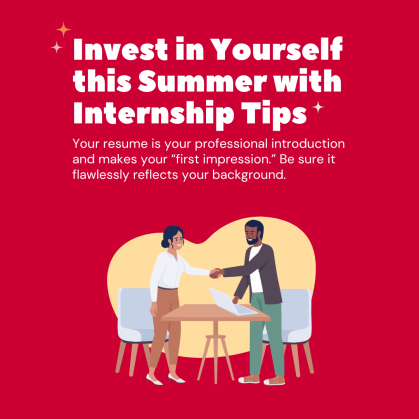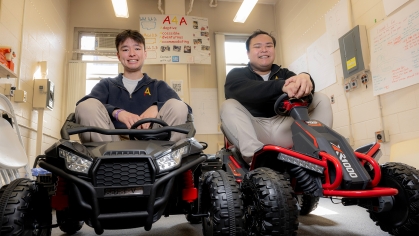Invest in Yourself this Summer with Internship Tips

It’s not the end of the world if you don’t have an internship this summer but how do you best prepare to get an offer for an internship next summer? Tom Matlock, whose Skills for Success elective course has been guiding students for ten years, shares his tips for landing an internship next summer.
-
Start NOW! Many companies begin their summer internship recruitment process a year ahead of time and start recruiting interns in September. It’s essential to be fully prepared by the beginning of the school year so you are aligned with the recruiting process. Use the summer to prepare. Don’t miss out!
-
Update your resume. Make sure that it “sells and doesn’t just tell" your story. Highlight your recent accomplishments, skills, competencies, and results. Don’t forget to make sure your resume looks professional, is easy to read, includes key words, and is free of spelling and grammatical errors.
-
Build your brand on LinkedIn. Build a strong profile summarizing who you are and what you’re looking for. Be sure to complete these sections on your profile: introduction, profile picture, background photo, headline, work experience education, coursework, honors and awards, contact information – and even a “looking for work” banner.
-
Perfect and practice your elevator pitch. Be able to quickly share who you are, what you are looking for, and what sets you apart in a :30 second introduction. Sample templates can help. Video yourself – so that you can see how your audience sees you – and gain confidence.
-
Fine tune your interview skills. Be prepared for in-person and virtual interviews platforms. Practice delivering STAR (Situation Task Action Results) answers for behavioral interview questions. Schedule mock interviews to sharpen your interview skills.
-
Schedule informational interviews. Reach out through alumni networks, LinkedIn, or personal connections to schedule 15-minute informational interviews. It’s a great way to grow your professional network and learn about companies that interest you.
-
Connect with people and groups. Summer is a good time to explore the student organizations most relevant to your skills and goals and learn how to join them. Many engineering groups have career development components that can provide further guidance.
-
Decide who you want to see at the Mega Fair. The Mega Fair is promoted before school starts, so you can find lists of companies who have committed to attending early. Research the companies you are most interested in and apply on-line and plan to visit their booths at the Mega Fair.
-
Pay attention to those companies holding networking events. If a company you’re interested in is hosting a reception, or early info session, go to it. It’s a great way to move your search forward. You never know who you may meet.
-
Connect with faculty when school starts. Company internships are a great way to gain experience but working on research with a professor is equally beneficial. Visit faculty websites over the summer to learn about opportunities with their labs. Be proactive and stop by their office hours to introduce yourself and find out more.


